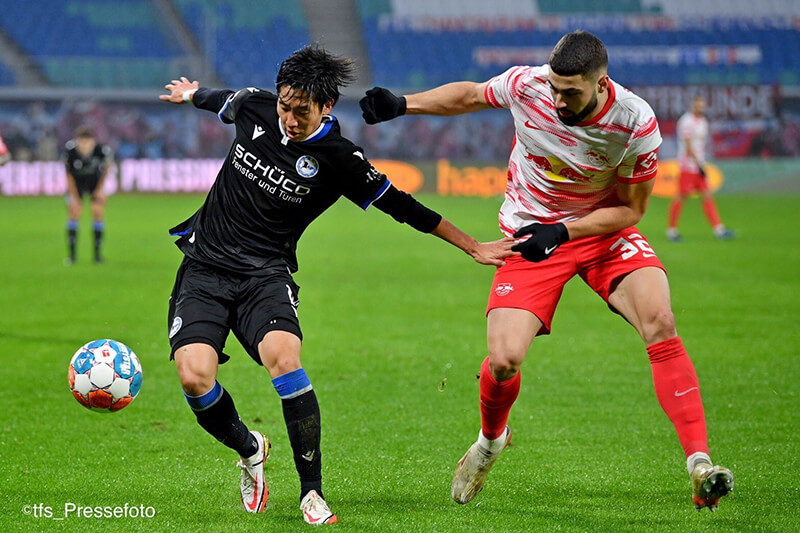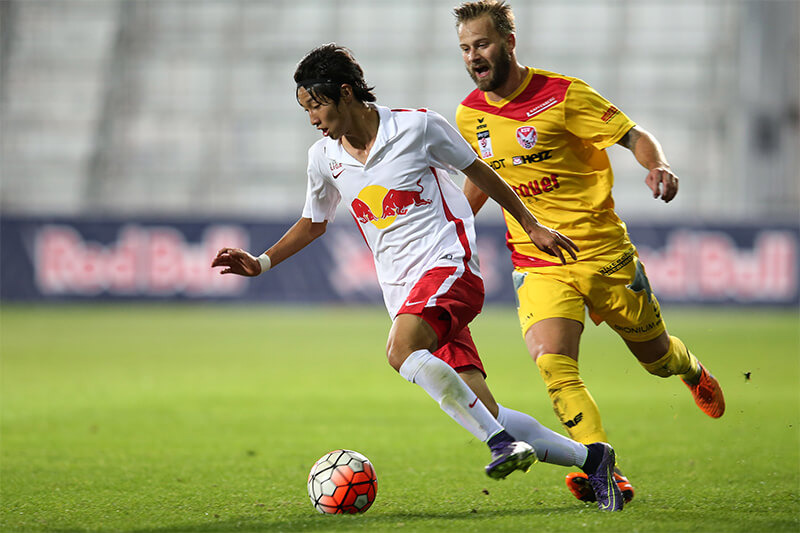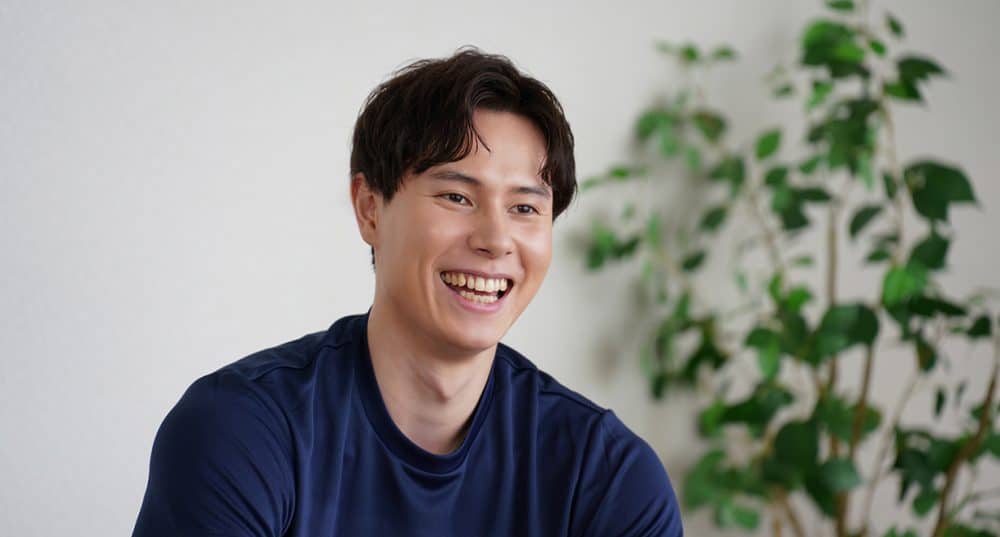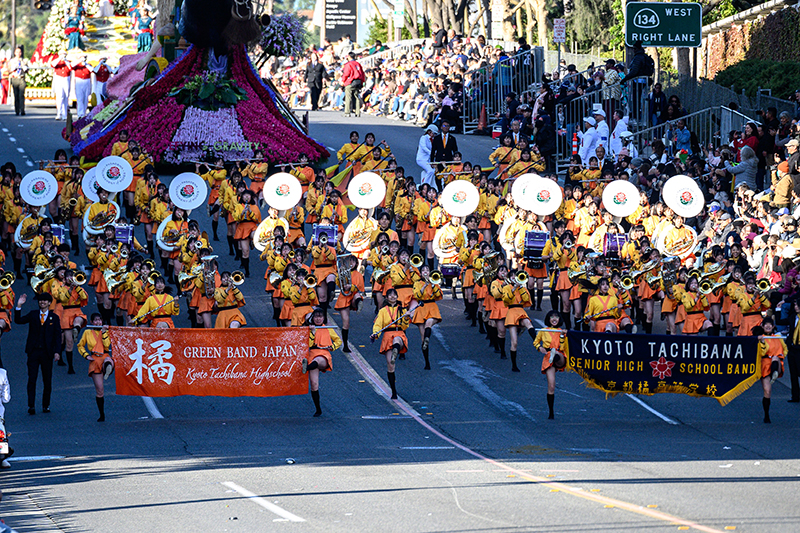Journal
サン・クロレラの取り組みや
サポートするアスリートたちのTOPICS。
Find out about Sun Chlorella's corporate activities and sponsored athletes
Masaya Okugawa
Soccer player/Arminia Bielefeld (German Bundesliga)
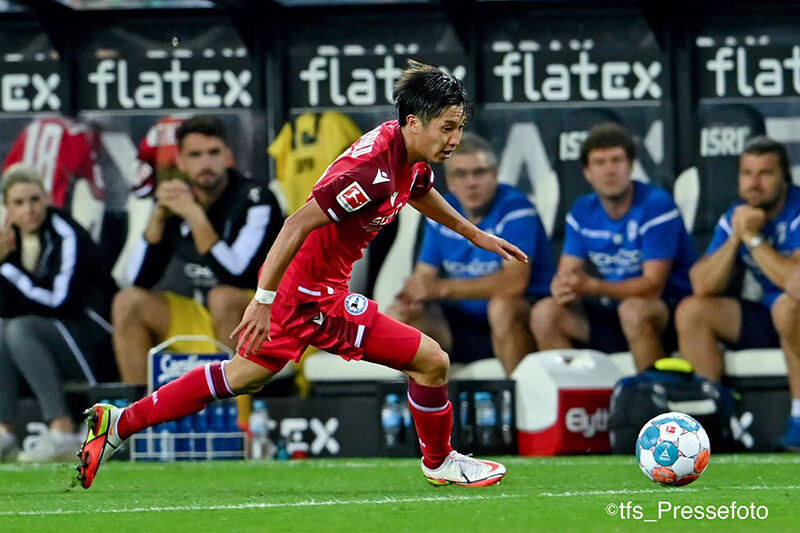
There are many Japanese players in Bundesliga, a first division football league in the soccer powerhouse, Germany. One such player is the 25-year-old attacking midfielder, Masaya Okugawa. He is someone that head coach Hajime Moriyasu of the Japanese men’s national soccer team also keeps an eye on.
Okugawa grew up in the youth system of the J.League’s Kyoto Sanga F.C., where he was registered on the club’s top team while he was still a high school student. And only six months after he signed his professional contract with Kyoto Sanga, he received an offer from Austria’s Red Bull Salzburg. There, he played for other Austrian and German clubs on loan before returning to Salzburg in 2020 and playing at the UEFA Champions League, the most prestigious club competition in European football. Currently playing for Germany’s Arminia Bielefeld since January 2021, Okugawa shares to us his childhood and his endeavors in Europe.
When a dream turned into a goal
Ever since he could remember, Okugawa played with a soccer ball. “I began playing soccer when I was 5 or 6. My brother three-years older than me was in a soccer club in elementary school and I used to watch him play. Playing soccer was popular around me, so there was a place where I started naturally.
Since Okugawa was born in April 1996, the timing when he started playing soccer coincides with the 2002 FIFA World Cup Korea/Japan. The entire country was excited over the tournament and naturally, Okugawa’s general interest in sports became focused on soccer. “I remember going to soccer games a lot to watch the Kyoto Sanga play. For me, they were the nearest team that I felt the closest to.”
Being on a boys’ soccer team in his hometown of Koka City, Shiga Prefecture, Okugawa was visibly showing his talent as the top goal scorer on the team. As he entered junior high, he became a member of the Kyoto Sanga’s U-15 team. Practicing in a competitive environment alongside talented teammates around his age, he became even more inspired to get better. “Ever since I was a kid my dream has been to become a professional soccer player, but that changed when I was in my second year in junior high when my dream became more like a goal for me to work towards. Kyoto Sanga’s junior youth team was very strong, winning at national tournaments multiple times. There was one time when our team was invited to England after winning a national championship. It was my first experience playing against an international team and I remember being so surprised at how differently we play. The opportunity inspired me a sense of identity, a feeling of not wanting to lose against international players. That was a definitely turning point a turning point for me in my second year of junior high, when I developed a new ambition to be a professional soccer player.”
Now or never: Salzburg
Okugawa’s determination to have the ability to compete against international players kept him motivated, and because his goal became clear, he could concentrate more during practice. When Okugawa stepped up to the youth team from junior youth at Kyoto Sanga F.C., he was selected to be on the Japanese national U-17 football team. In his third year in high school, he played in the national U-18 team while also being registered on the professional top team. He was steadily making his way towards his goal.
Soon after, Okugawa was receiving offers from multiple clubs in Europe. He signed with the Austrian professional football club Red Bull Salzburg in June 2015, only six months after he graduated high school. “To be honest, I wasn’t so sure if it was the right timing to transfer to a different team. I wanted to play internationally for sure, but at the same time I was surprised at how soon that opportunity came to me. I also wanted to give back to Kyoto Sanga F.C. before I left because they’ve been so good to me. I asked around a lot of people for their opinion. There were many people who said that I should achieve a certain level of success in Japan before going international, but I felt that if I chose to let go of this chance, the same opportunity might never come again. That’s why I decided to go.”
Patience pays off
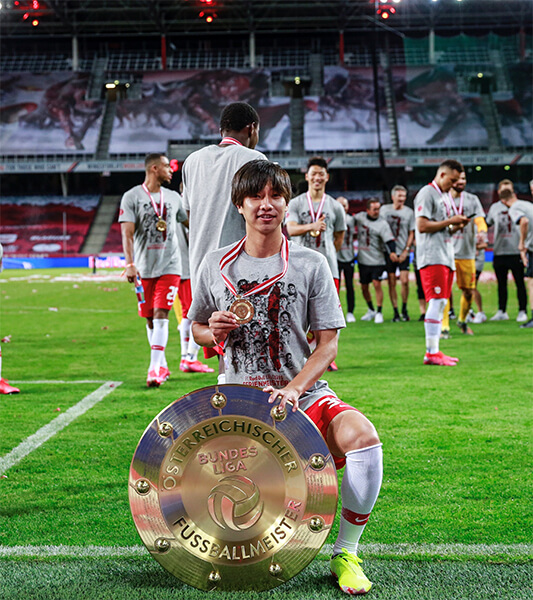
After signing the contract with Salzburg, Okugawa was immediately assigned to a different Austrian soccer club with a fixed-term contract. In sports, this system is called a loan. He found himself playing for another team the next season, and in the one after that, he was a member on a team in the second-tier division in Germany. Salzburg had acknowledged his talent initially, but he wasn’t given the chance to actual play for them. “There were times when I wasn’t picked to play for the team that had me on loan, which made me feel anxious about not being able to return to Salzburg if I stayed that way. I felt pressured and had a tough time mentally.”
Eager to prove his capabilities but not given the opportunity to do so—in a situation where one could easily feel defeated, Okugawa found ways to stay motivated. “I continued to check out Salzburg’s games while I was away as a loan player, and watching my teammates play pushed me to work harder. Even when I had to sit on the sidelines, I went back to practice with confidence, reminding myself that I was the best player. I worked really hard to maintain my motivation by turning my frustrations into positivity, believing that one day I’d play on the pitch if I kept practicing.”
Okugawa also made active efforts to communicate with the head coach. He learned some German while he attended the Ritsumeikan Uji Senior High School and continued to study the language during his time in Austria by hiring a private tutor. Even then, he found it difficult to fully communicate his thoughts when it came to expressing nuances. At such times, they used a board that resembled a soccer field to communicate. Okugawa always asked for clarification on even the slightest things. “No matter which team I was playing for, I made sure to pay attention to the team’s game strategies and the kind of performance that were expected out of us. It’s also important to get your teammates acknowledge your talent. If you can really deliver at the very first practice when you join a new team, your teammates would let you be a part of them for sure and pass the ball to you. And when that happens, the head coach would also want you on the pitch.”
Okugawa kept trying and give his best effort both on and off the pitch. The first time his hard work and patience paid off was during his fifth year overseas, when he kicked off the 2019 season in July as a Red Bull Salzburg player. He played in the UEFA Champions League, the most glamorous football tournament in Europe. There, Okugawa played in 23 games and scored a total of 9 goals, contributing to the club’s seventh successive Austrian Bundesliga title and the seventh Austrian Cup win. “The number one reason why I decided to sign with Salzburg was to one day play at major tournaments like the Champions League and the Europa League. I’m very happy that I achieved those goals when I came back to Salzburg, but I was also nervous since the club has been a defending champion for a while in both the League and the Austrian Cup. I definitely felt the pressure during that season.”
At the time, fellow Japanese player Takumi Minamino was also on the same team. He is two academic years older than Okugawa and was like his older brother. “He gave me all kinds of advice at practice, and I watched him play on the pitch. It meant a lot to me that someone like him took his time to talk to me and motivated me to work harder. He also took me out to eat during our time off. He helped me out a lot.”
Okugawa was finally able to prove his talent in the Austrian powerhouse Red Bull Salzburg. It was time for him to step up his game even further
